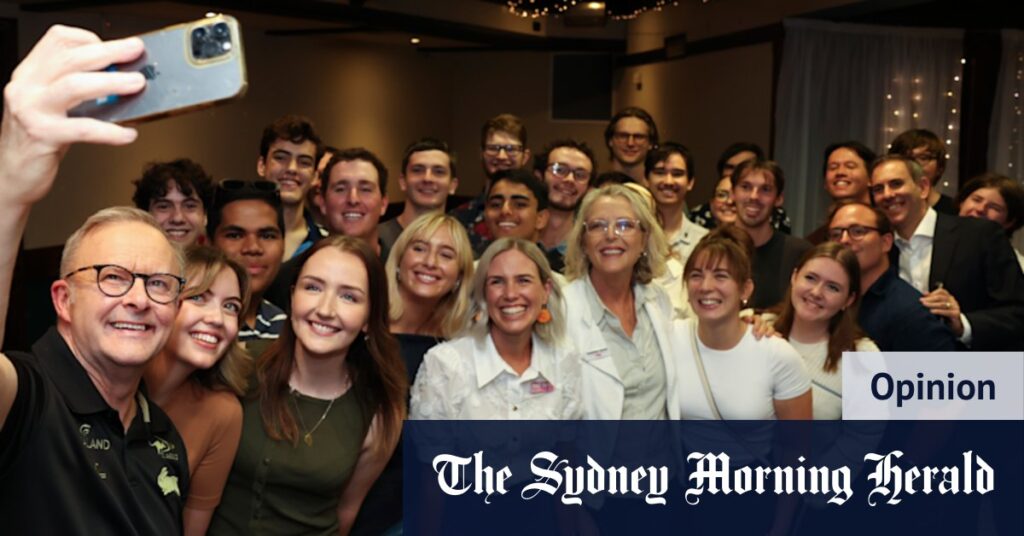It’s the great heist of our times. At this federal election, “the youth” will seize the initiative from the old folks and vote on the issues which matter to them. What they want, according to experts, is for “government” money to be pumped into housing, more renewable energy, free stuff – like TAFE and discounted higher education (HECS) loans for university tuition, and more government programs to stop them feeling bad about themselves (mental health) and others (discrimination).
Anthony Albanese takes a selfie with Queensland University students and staff. “At this federal election, ‘the youth’ will seize the initiative from the old folks and vote on the issues which matter to them.”Credit: Alex Ellinghausen
The narrative has taken hold among voters under 40 that this money is somehow going to set things to rights for young people facing declining living standards. Well, the joke’s on them: the money they’re awarding themselves doesn’t appear from thin air or get creamed from “the rich”. It’s money they’re borrowing from their future selves and their prospective wealth.
The wrong-headed story is the reason midlife Millennials are struggling to get ahead, though most haven’t yet reached the stage of insight into how it happened. But as this cohort hits midlife, it’s becoming clear that the standard of living their parents enjoyed is simply not going to be available to them. Their rent is going up, eroding their ability to save. They’re despairing of ever being able to afford to buy a house anywhere near where they work, let alone in the pleasant environs in which they grew up. If they have dared to have children, they’re starting to worry about the quality of education they will be able to provide for them.
That’s because they are today $25,000 a year, per person, worse off than they should be. As Productivity Commissioner Danielle Wood explained in a recent speech, “had we been able to maintain productivity growth from 1995 to 2023 at the 2.2 per cent average of the 1990s, real annual average incomes for most workers today would be $25,000 higher”.
Productivity is underpinned, among other things, by education quality, which has slipped in Australia. It also requires an appropriate allocation of human capital – for instance, we shouldn’t be wasting young lives by doing university degrees for jobs which are better learnt on the tools. And people with good business ideas have to be able to get on with realising them without excessive regulation. In failing or skewing incentives in these areas, government policy has robbed young people of hundreds of thousands of dollars over the course of their working lives.
Loading
And the situation is getting worse. As Wood illustrated with a devastating graph, Australians born in the 1990s – that’s the later part of the Millennial cohort, which is defined as 1981-1996, and first of the Gen Zs born after 1997 – are earning no more than those born in the 1980s. To put that into context, every birth cohort before the 1990s earned more than the cohort born in the previous decade at the same age.
While they are earning no more, they are paying more taxes to fund government programs. As a result, in Wood’s words, “average real disposable incomes for young people went backwards in the decade before COVID”.
If only someone had warned us that this might happen. If only someone had told young people when they were starting to vote in 2002 that the government spending and policy choices they voted for could materially affect their future lives. Perhaps someone would have said, in a time when “Australia’s social welfare payments [were] well targeted and government debt [was] low”, that “if policies are not adjusted, the current generation of taxpayers [mainly the Baby Boomers] is likely to impose a higher tax burden on the next generation”.
Read the full article here

